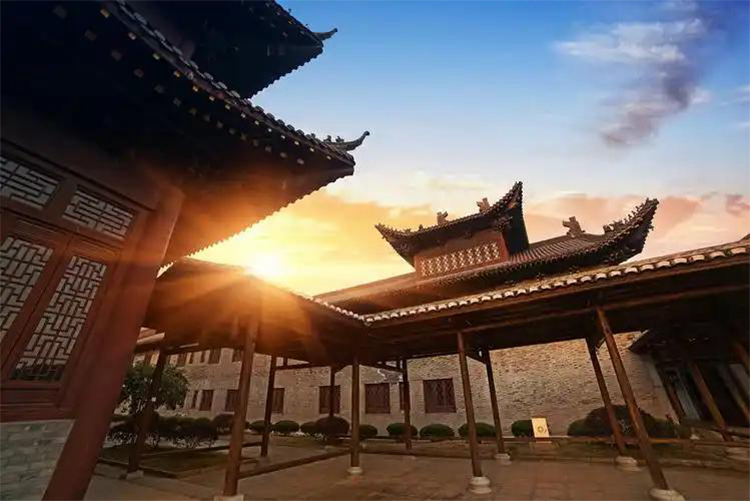Meditation Retreat in China: Yichun Chandu Cultural Park Travel Guide
Introduction:
Stepping into Yichun’s Chandu Cultural Park feels like pressing the world’s slow-motion button. Gray-tiled walls and bamboo groves, stone bridges and rippling reflections—every step echoes a millennium of Zen. This 300-acre site is not a typical museum but an immersive field of Eastern spirit where visitors—whether Zen enthusiasts, creative seekers, or travelers wanting quiet—can experience “one flower, one world” in living form.
1. Zen Culture: A Three-Dimensional Encyclopedia
As one of China’s rare comprehensive Zen-themed parks, Chandu centers on the principle of “seeing one’s nature and becoming a Buddha,” turning abstract teachings into tactile experiences. The core Zen Culture Museum guides you through Zen history via three narrative threads:
– Artifacts Hall: Over 200 treasures, including the Tang dynasty stone carving of Baizhang Qinggui and Song dynasty wooden monk statues. A Ming-era handwritten sutra, the Chanmen Rirong, preserves the rhythm of a thousand morning bells and evening drums.
– Light-and-Shadow Zen Hall: Holographic projections reenact famous koans—such as the “flower smile” and Nanquan’s cat—bringing paradoxical teachings out of ancient pages.
– Interactive Insight Area: Try tracing fragments of the Heart Sutra, reconstructing pieces of the Joshu “go have tea” dialogue, and experience the spirit of “no reliance on words” through playful, reflective displays.
2. Architecture as Zen: Four Layers of Meaning
The park’s buildings are physical expressions of Zen aesthetics:
– 形之简 (Simplicity of Form): The museum embraces “less is more,” with fair-faced concrete and wooden lattices forming a vessel of emptiness.
– 境之幽 (Quiet Atmosphere): The garden borrows karesansui (dry landscape) methods using local Huanglashi stone; moss spreads like green ripples across stone paths resembling an unstruck zither.
– 声之寂 (Silence of Sound): Bamboo water devices drip every 108 seconds—matching a mala’s beads—to suggest awakening through sound.
– 光之禅 (Zen of Light): Diamond-shaped light patches filtered through wooden shutters move across exhibits, dramatizing the ephemeral meeting of time and clarity.
3. Must-Do Immersive Experiences
Beyond gallery visits, these activities let Zen seep into your bones:
– 6:00–7:00 — Dawn Meditation: Practice guided breath awareness in front of the ancestral hall as morning bell tones echo; white egrets often accompany the mist.
– 15:00–17:00 — Afternoon Tea Ceremony: Taste organic Mingyue Mountain tea in a three-step brewing ritual that embodies tea and Zen as one flavor.
– New and Full Moon Days: Join monks on a traditional alms walk or participate in a communal recitation of the Diamond Sutra in the central plaza.

4. Practical Visitor Guide
– Highlight Route (2 hours): Zen Culture Museum → Five-Leaf Altar (reliefs of the five Zen schools and seven lineages) → “Go Have Tea” teahouse → Wuxin Bridge fish viewing.
– Deep Route (half day+): Add the Zen-farming area to learn rice milling and traditional oil pressing, and complete a walking meditation along the Silent Path.
– Language Support: English audio guide covers 20 core exhibits; the front desk offers a concise English brochure.
– Tips: Closed Wednesday mornings for maintenance. Reserve meditation sessions at least one day in advance via the official “Yichun Chandu” WeChat account.
5. Nearby Cultural Connections for a Full-Day Zen Loop
– Morning: Start at Chandu Cultural Park (arrive by 8:30 to avoid group tours).
– Lunch: Drive 8 minutes to Suxinyuan restaurant for vegetable-based dishes crafted to mimic meaty textures.
– Afternoon: Visit Qiyin Zen Temple (Weiyang lineage) to see a Tang-dynasty relic pagoda (25-minute drive).
– Evening: Relax at Wentang town’s selenium-rich hot springs by the old well (40-minute drive).
Conclusion:
When the sunset gilds the bronze statue of Master Baizhang Huaihai, the park reveals itself not only as a repository of knowledge but as a mirror for the heart. Questions loosen in the steam of tea and thoughts settle on the stone paths—souvenirs both light and weighty. Silence your phone and let Chandu become the quiet, unforgettable pause in your China journey.

Practical Info:
– Address: No.1699 Jinxiu Avenue, Yuanzhou District, Yichun, Jiangxi Province
– Opening hours: 9:00–17:00 (last entry 16:30)
– Admission: 80 RMB (museum included). Foreign visitors may buy tickets on site with passport.
– Transport: 15-minute taxi from Yichun Railway Station; Bus No.19 stops at “Chanboyuan” for direct access.
– Online: The official site offers an English virtual tour preview.


